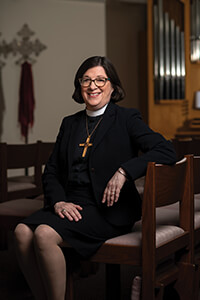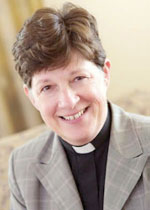Spruce up our spiritual house
October 21, 2014
I’m spiritual, not religious.” How many times have we heard that, usually from people who consider their unchurched status a mark of honor. When I heard this as a parish pastor, I became frustrated, especially when folks waxed lyrical about a spiritual experience engendered from contemplating the beauty of a mountaintop. This was perplexing because I served in Ohio. There are no mountains. I was tempted to dismiss it as laziness. But now I think they are on to something.
This coincides with what I am thinking after a year in office. The four “emphases” or “strategic intents” or “things” I’ve identified — we are church, we are Lutheran, we are church together, we are church for the sake of the world — have resonance across the ELCA. It’s how I’m organizing my work.

A clear sense that worship is at the heart of what we do together and at the heart of our worship is the crucified and risen Christ — this is the essential foundation for our life and work together. Being clear about our confessional Lutheran identity facilitates our witness to the gospel and makes possible authentic ecumenical, interreligious and secular engagement. Being church together is a manifestation of the unity we have through baptism into the body of Christ. It is a source of strength. It is scriptural. Being church for the sake of the world is the natural extension of being church, Lutheran and church together. We get to participate in God’s renewing and reconciling work in the world God so loves.
I’m still developing these emphases, but the “we are church” is claiming my immediate attention.
We are church. We do many wonderful things as the church. We feed the hungry, welcome the stranger, clothe the naked and visit the sick. Why do we do these things and how are we able to do them? As I have written before, we are not the American Cancer Society or a nongovernmental organization. Peter instructed us that “like living stones, let yourselves be built into a spiritual house, to be a holy priesthood” (1 Peter 2:5). We are ekklesia — an assembly called out from the world and to God.
There is nothing wrong with employing the best practices of the business world, but before the strategic planning, goal-setting and program implementation we need to be about tending our individual and corporate spiritual life. As a church we need to engage in basic spiritual practices: prayer, silence, corporate worship, Scripture study, giving, service. These are ways God comes to us. These disciplines create a space in us, an openness, for God’s Spirit. They chip away at our willfulness. They make us aware of God’s presence in our lives.
These spiritual practices aren’t magic or a kumbaya fad. They have been part of the Christian tradition for millennia. They are part of the Lutheran tradition. Martin Luther’s morning and evening prayers are precious models of spiritual practice (Evangelical Lutheran Worship, 1166). Unfortunately, we’ve lost this part of our tradition. We’ve become religious, not spiritual. There is strong evidence that tending the spiritual life is what millennials are longing for. I think the rest of us are too.
However, the intention must be there also. We are such active, useful people. We are “distracted by (our) many tasks” (Luke 10:40). We might mean to practice spiritual disciplines, but there is real work to do. Attending to God is our real work. Set aside the time. Mark it on the calendar. Then show up. Show up with our whole selves. Give God our complete attention. Practicing these disciplines is not about productivity — it’s about being fully and expectantly present to God. Spiritual life is not multitasking.
We might shy away from this whole business because it seems so inward focused and self-absorbed. It’s not. It’s the spiritual equivalent of putting our oxygen mask on first before assisting others. Practicing these disciplines is so that we can glorify God and serve in ways that are abundant and clear.
We have a rich tradition as Lutherans: theological rigor, liturgical worship, musical excellence. Engaging in spiritual practices doesn’t supplant any of this. It’s part of our life as church. We can be spiritual and religious.

